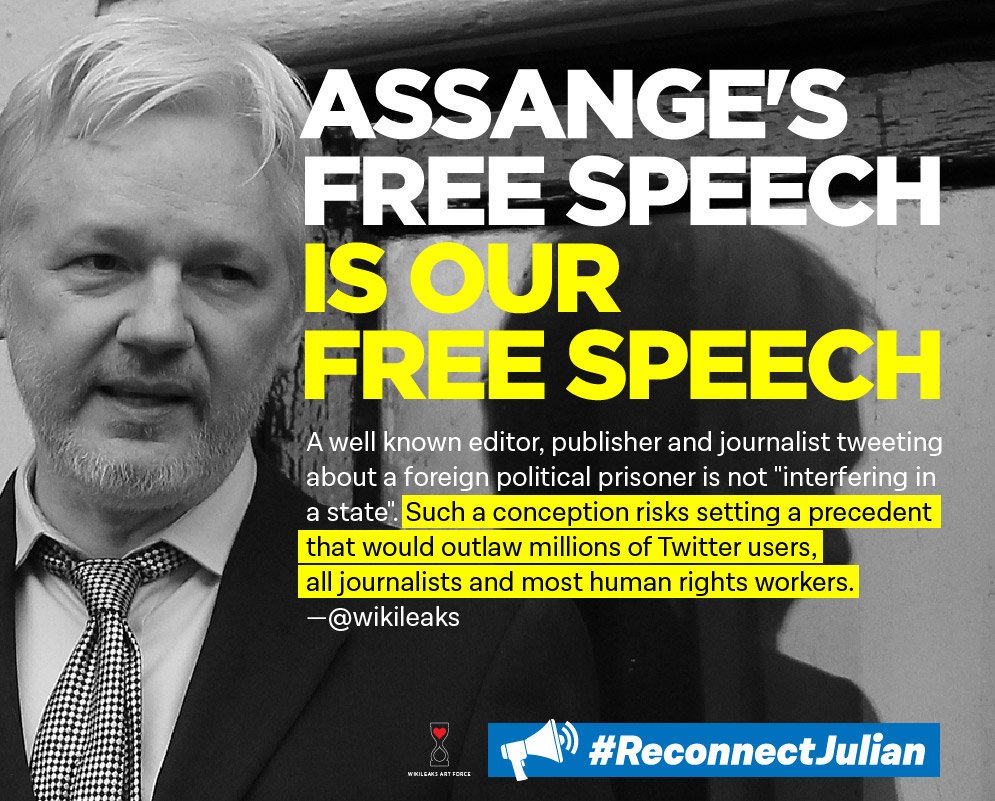
Protection Action
On March 28, 2018, the government of Ecuador imposed a unilateral incommunication on Julian Assange. Mr. Assange’s ability to the communicate with the outside world was blocked both physically and by embassy and foreign ministry authorities for seven months:
All visits, other than legal visits, were refused by the embassy, including meetings requested by major human rights organisations, and members of parliament.
For months, Mr. Assange’s lawyers requested that the government provide the administrative or legal basis for the restrictive measures, in order to challenge their legality before the courts. The government refused to provide information that would allow him to challenge the measures before a court.
Ecuador’s President told AP: "if Mr Assange promises to stop emitting opinions on the politics of friendly nations like Spain or the United States then we have no problem with him going online."
On 12 October 2018, the embassy delivered a "protocol" with explicit threats to revoke Mr. Assange’s asylum if Mr. Assange, or any of his guests, breached or were perceived to have breached, any of the 28 "rules" in the protocol. The rules provide that the embassy can seize Mr. Assange’s property or his visitors’ property and hand these to UK police, and report Mr. Assange’s visitors to UK authorities. The protocol requires the IMEI codes and serial numbers of electronic devices used inside the embassy. The private information required of visitors and Mr. Assange’s lawyers by the embassy is shared with undisclosed agencies.
The "protocol" also forbids Assange from doing journalism and expressing his opinions, under threat of losing his asylum.
The protocol appears in the context of a strong, supportive https://justice4assange.com/IMG/pdf/Inter-American_Court_Advisory_Opinion_OC-25-18.pdf"ruling by the Interamerican Court on Human Rights, setting out Ecuador’s obligations in relation to Mr. Assange (paras 178 onwards), which was announced amidst reports in the Sunday Times that the UK and Ecuador were reaching a "high level" agreement to breach Assange’s asylum by handing him over to UK police to be arrested.
Ecuador recently secured $1.1bn in loans. The US representative to the IMF told Ecuador in late 2017 that loans were conditional on Ecuador resolving the Assange and Chevron matters. Throughout the Summer pressure from US law-makers mounted on Ecuador to hand Assange over to the UK.
In June, President Moreno met with Vice-President Mike Pence. Moreno denied Assange had been discussed. The White House, on the other hand, stated:
Ahead of Pence’s visit, ten senators from both sides of the political divide urged the Vice President to pressure President Moreno over Assange. Ahead of the midterms, the ranking Democrat of House Foreign Relations Committee made an inflammatory demand directly to Ecuador’s president Moreno to hand Assange over to UK authorities. In the letter, Assange is called "a dangerous criminal and a threat to global security" and the letter says Ecuador that crucial bilateral relations in the area of commerce and security depend on Ecuador "resolv[ing] the significant challenge" of "the status of Julian Assange".
The "protocol" (Spanish original, English, unofficial), if implemented in this manner, aims to circumvent the obligations set out in the Interamerican Court’s ruling with the pretext of violations of ’’protocol rules’. The protocol is a flagrant violation of the Interamerican Court’s decision.
The "protocol" and the forced, arbitrary incommunication imposed on Mr. Assange for seven months was the subject of a protective action measure before a court in Quito on 25 and 29 October 2018.
During the proceedings, Mr. Assange spoke to the court over videolink.
The judge refused to rule on the constitutionality of the government’s actions against Mr. Assange and said it was a matter for the Constitutional Court.
The judge declined to hear witnesses and declined to accept evidence documenting the embassy’s visitor ban.
On 30 October 2018 the case was appealed to the provincial court.
Application to the District Court for Protection Action measure
Accion de Proteccion
Amicus Curiae
During the proceedings five amicus curiae intervened: academics and human rights workers, all in favour of Mr. Assange’s application (Spanish):
Amicus Curiae Fernando Casado
Amicus Curiae Jaime Fabián Burbano Gutiérrez, Colectivo KolectiVOZ
SOURCE:
https://justice4assange.com/Protection-Action.html























No comments:
Post a Comment